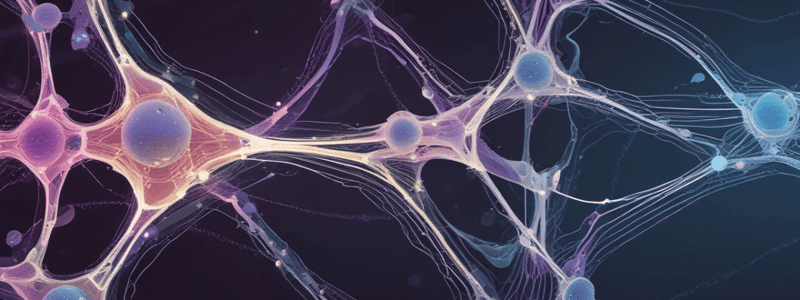Podcast
Questions and Answers
What is the function of the signal recognition particle (SRP)?
What is the function of the signal recognition particle (SRP)?
- To translate the protein
- To add sugar residues to the protein
- To cleave the N-terminal signal sequence
- To recognise the signal sequence and arrest translation (correct)
What happens to the signal sequence after translation is resumed?
What happens to the signal sequence after translation is resumed?
- It is inserted into the ER membrane
- It is released into the ER lumen
- It is passed to the Golgi apparatus
- It is cleaved by a protease (correct)
What is the role of oligosaccharyl transferase in protein synthesis?
What is the role of oligosaccharyl transferase in protein synthesis?
- To form disulphide bonds
- To add sugar residues to the protein (correct)
- To cleave the signal sequence
- To recognise the signal sequence
What is the function of chaperone proteins in the ER lumen?
What is the function of chaperone proteins in the ER lumen?
What happens to misfolded proteins in the ER lumen?
What happens to misfolded proteins in the ER lumen?
What is the purpose of the translocon in the ER membrane?
What is the purpose of the translocon in the ER membrane?
What is the fate of the SRP after translation is resumed?
What is the fate of the SRP after translation is resumed?
Where do proteins that are damaged in the ER lumen get moved to for degradation?
Where do proteins that are damaged in the ER lumen get moved to for degradation?
What is the function of ubiquitin ligase?
What is the function of ubiquitin ligase?
What is the result of the delta 508F mutation in cystic fibrosis?
What is the result of the delta 508F mutation in cystic fibrosis?
How does human cytomegalovirus (HCMV) evade the immune system?
How does human cytomegalovirus (HCMV) evade the immune system?
What is the role of Rab in organelle identity?
What is the role of Rab in organelle identity?
What happens to proteins folded and N-glycosylated in the ER?
What happens to proteins folded and N-glycosylated in the ER?
What is the function of the M6P receptor?
What is the function of the M6P receptor?
What is the result of defective Rabs?
What is the result of defective Rabs?
What is the role of SNARE proteins?
What is the role of SNARE proteins?
What is the purpose of COPI vesicles?
What is the purpose of COPI vesicles?
What is the purpose of enzyme replacement therapy (ERT)?
What is the purpose of enzyme replacement therapy (ERT)?
Flashcards are hidden until you start studying
Study Notes
ER Protein Synthesis and Modification
- ER luminal proteins have a hydrophobic signal sequence (more than 8 contiguous hydrophobic residues) at the N-terminal, while integral membrane proteins have this sequence internally.
- The signal sequence is recognized by the signal recognition particle (SRP) as soon as it is translated, leading to translation arrest.
- The SRP-nascent peptide chain associates with the SRP receptor on the ER membrane, and then with a translocon (ER membrane channel) to check the signal sequence.
- The nascent peptide is inserted into the translocon in the appropriate orientation, which is crucial as it cannot be altered later.
Protein Modification in the ER Lumen
- As the growing peptide emerges into the ER lumen, it is scrutinized by enzymes such as protease, which cleaves any N-terminal signal sequence.
- Oligosaccharyl transferase identifies asparagine residues and adds pre-assembled sugar residues in a process known as N-linked glycosylation.
- Chaperone proteins, such as BiP, help the growing peptide fold into its correct shape.
ER Quality Control and Degradation
- Misfolded ER proteins are removed through the ER-associated degradation (ERAD) pathway, which involves ubiquitin ligase and the attachment of ubiquitin to lysine residues.
- More than 30% of all ER proteins are marked for degradation.
- Defects in the ERAD pathway can lead to diseases, such as cystic fibrosis and Parkinson's disease.
Protein Trafficking from the ER
- Proteins are packed into vesicles and transported to other organelles, with identity labels such as Rab and lipids.
- Rab is a small G-protein that is active when bound to GTP and inactive when bound to GDP, and plays a crucial role in organelle recognition.
- Defective Rabs can cause diseases, such as Charcot-Marie-Tooth disease and legionnaire's disease.
Golgi Apparatus and Protein Modification
- Proteins folded and N-glycosylated in the ER are collected into COPII vesicles to move to the cis Golgi.
- Within the Golgi, sugar structures of most proteins are trimmed and modified, and proteins directed for lysosomes are marked with mannose-6-phosphate (M6P).
Lysosomal Function and Disease
- Soluble proteins destined for lysosomes are recognized by the M6P receptor, which binds to the M6P modification.
- Many enzymes are uniquely expressed in lysosomes, and genetic differences in these enzymes can lead to lysosomal storage diseases (LSDs).
- Enzyme replacement therapy (ERT) is a treatment for LSDs, which involves administering M6P-modified forms of missing enzymes.
Endocytosis and LDL Receptor
- Low density lipoprotein (LDL) receptors bind to the ApoB-100 component of LDL and are internalized through clathrin-coated pits.
- In the acidic lumen of endosomes, LDL dissociates from its receptor, and is then passed to lysosomes for degradation.
- The LDL receptor is recycled to the plasma membrane, making up to 100 trips before being degraded.
Studying That Suits You
Use AI to generate personalized quizzes and flashcards to suit your learning preferences.



